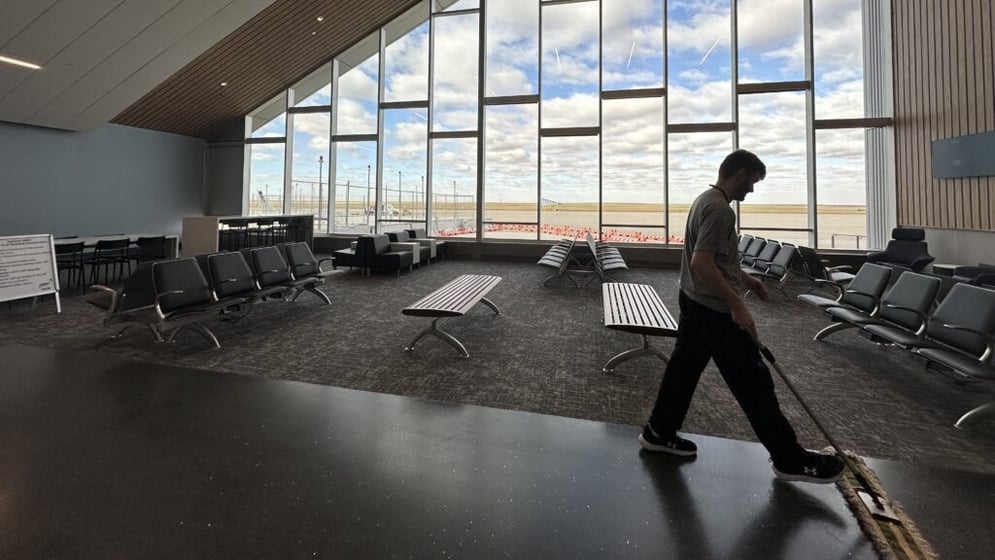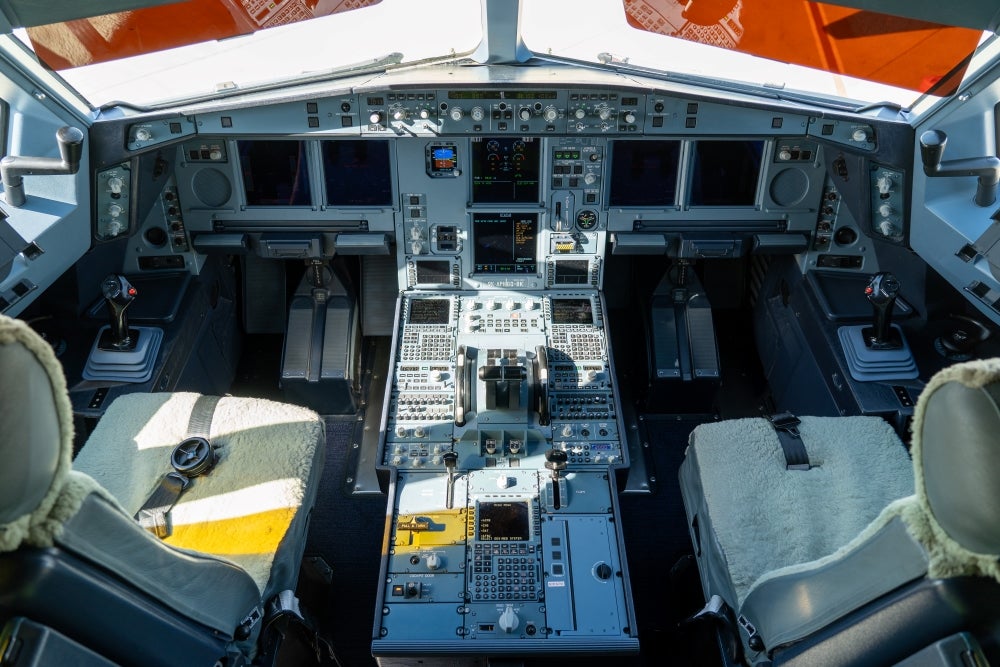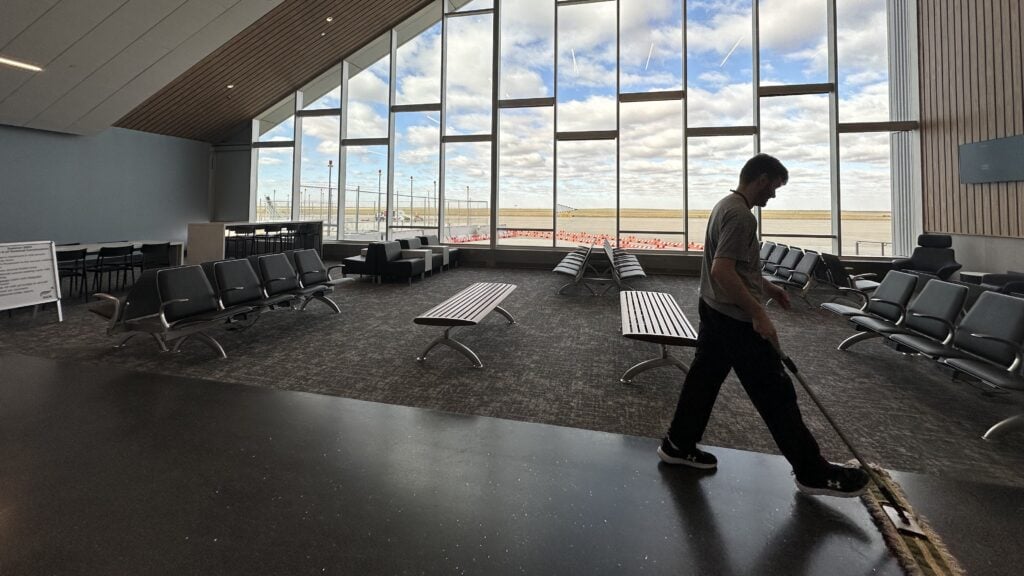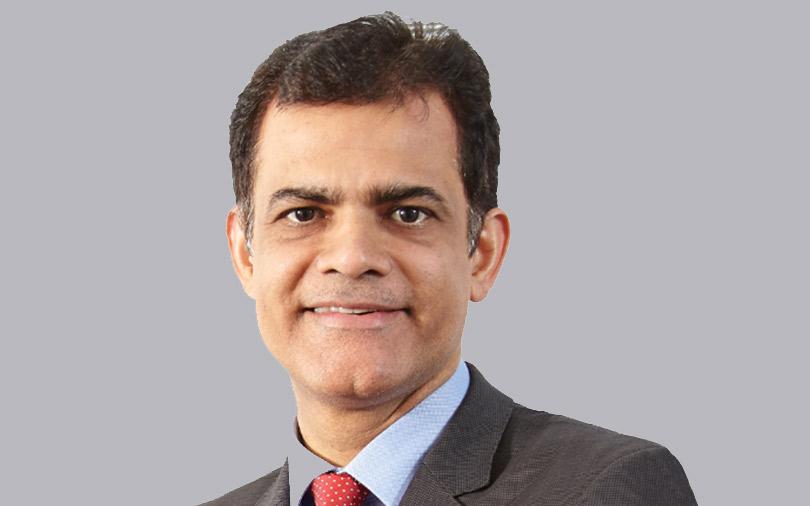News

Garden City Regional Airport maintenance worker Jacob Ochampaugh sweeps the floors of the new departure gate. The airport terminal was revamped this year, as airport officials expect increased ridership. (AJ Dome/Kansas Reflector)
TOPEKA — Gov. Laura Kelly signed legislation supported by more than 150 legislators that would triple to $15 million annual state investment in modernization and infrastructure repairs of airports in Kansas.
On Thursday, Kelly put her signature to House Bill 2498 to broaden resources dedicated to improvements at 109 airfields. The Kansas Department of Transportation recommended lawmakers adjust the current $5 million state appropriation, which hadn’t been increased since 2013.
A recent state assessment of airports in Kansas indicated runway pavement conditions were deteriorating. The budget could be used for that type of safety upgrade, automated weather observation systems, rehabilitation of existing aviation facilities or the planning and building of new infrastructure.
“These airports are very important to our economy and to providing air ambulance access to trauma centers for many of our rural citizens,” said Sen. Mike Petersen, the Wichita Republican chairman of the Senate Transportation Committee.
KDOT secretary Mike Reed said the collection of airports in Kansas generated at least $9 billion in annual economic output and investment of tax dollars into the system translated into jobs and better quality of life for Kansans. The bill passed the Senate 34-5 and the House 117-4.
Meanwhile, the Democratic governor signed House Bill 2527 forbidding the Kansas Corporation Commission from approving retirement of fossil fuel or nuclear generating units unless the utility owner demonstrated it wouldn’t undercut regional electricity rate competitiveness or harm consumers. The law mandated a utility interested in shutting down a generation station had to show it could meet consumer demand with remaining assets.
The legislation unanimously passed by the House and adopted in the Senate 33-2 would amend the state’s net metering statute to increase a cap on the amount of power renewable energy systems, including solar, could sell to their utility provider through the state’s electric grid.
Kelly signed House Bill 2124 to alter state regulation of microbreweries so those companies could distribute beer or hard cider, but would reduce the number of barrels a microbrewery could manufacture and store each year from 60,000 to 30,000.
It also required delivery of a report by Jan. 15, 2025, to the Legislature and governor on compliance of licensed microbreweries with state tax laws, rules and regulations on the sale of beverages.
The microbrew legislation, which exited the Senate 37-2 and the House 118-3, included language enabling a microbrewery owner, stockholder or director to have an ownership interest in a licensed club, drinking establishment or caterer.
Kelly signed into law House Bill 2588 to establish boundaries for county governments issuing permits and assessing fees on telecommunications providers applying to make use of the public right of way. The measure would guarantee carriers the right to construct and maintain poles as well as conduit, cable, switches and related equipment within a public right-of-way under jurisdiction of a county government.
The law mandated counties treat similar telecommunications providers in a competitively neutral manner when making decisions on permits and fees. It was adopted by the House 113-7 and in the Senate 26-7.
Under House Bill 2481, passed unanimously by the Legislature and signed into law by Kelly, the Atchison, Topeka and Santa Fe #3415 would be designated the official state steam locomotive and the Abilene & Smoky Valley Railroad would become the official state heritage railroad.
The law also assigned names to portions of Kansas highways, including portions of K-96 as the PFC Henry Lee Fisher Memorial Highway and the 96th Infantry Division Memorial Highway; a portion of US Highway 69 as the Ken Brock Memorial Highway; a portion of US Highway 81 as the Merle Miller Memorial Highway; and a portion of US Highway 281 as the First Responders Memorial Highway.
Homegrown alternate asset manager 360 ONE Asset Management Ltd, formerly known as IIFL Asset Management, has invested Rs 200 crore (around $25 million) in real estate consultancy firm Anarock Property Consultants Pvt. Ltd.
Anarock, which is active in India and the Middle East, said the investment will help the company improve technology, accelerate expansion, and introduce innovations.
“The capital has been earmarked for faster business expansion and fine-tuning our proprietary proptech platforms, which have proved to be game changers for our real estate marketing capabilities,” Anarock Chairman Anuj Puri said. “We will continue to explore new high-growth business opportunities.”
Anarock was founded in 2017 by Rohin Shah and Puri. Shah is also the managing director of UK-based Marylebone Asset Management.
Over the last six years, the firm has expanded from being a residential-focused organisation to complementary sectors including retail, commercial, hospitality, logistics and data centres, industrial and land.
Anarock also offers strategic advisory, investment banking, research, and valuations. It also provides app-based flexible workspaces and society management services and has a team of over 2,200 professionals.
Sameer Nath, chief investment officer and head of venture capital and private equity at 360 ONE Asset, said that the investment was backed by Anarock’s management team, premier marketing and advisory capabilities and a clear leadership in India’s large and growing real estate services sector.
360 ONE Asset is a part of the 360 ONE group, a wealth and alternates-focused institution with more than $54 billion in assets under management.

European aeronautical manufacturer Airbus has signed a multi-year contract with technical consultants Sopra Steria.
The international agreement is targeted at modernising Airbus’s “methods and tools,” according to the Paris-based Sopra Steria.
Global energy transition is one of the themes at the forefront of the agreement according to the firms.
“Sopra Steria will help Airbus modernise its engineering processes, methods and tools in line with the sector’s key priorities, such as reducing carbon emissions from the production process, improving product lifecycle management software and developing innovative future aviation tools,” the pair stated.
The airframe, flight physics, engines, systems, and flight and propulsion testing sectors will all be included in the contract, which will span operations in Canada, France, Germany, India, Poland, Spain and the UK.
A key area for development is the Airbus avionics department where better flight control data is a major goal.
Access the most comprehensive Company Profiles
on the market, powered by GlobalData. Save hours of research. Gain competitive edge.

Company Profile – free
sample
Your download email will arrive shortly
We are confident about the
unique
quality of our Company Profiles. However, we want you to make the most
beneficial
decision for your business, so we offer a free sample that you can download by
submitting the below form
By GlobalData
“It’s great to see our expertise across the aeronautics value chain recognised in this way by one of the giants in the sector,” said Josselin Demessine, head of Sopra Steria’s engineering department.
At least 700 Sopra Steria staff will be deployed on the contract, with most attached to its Aeroline business.





